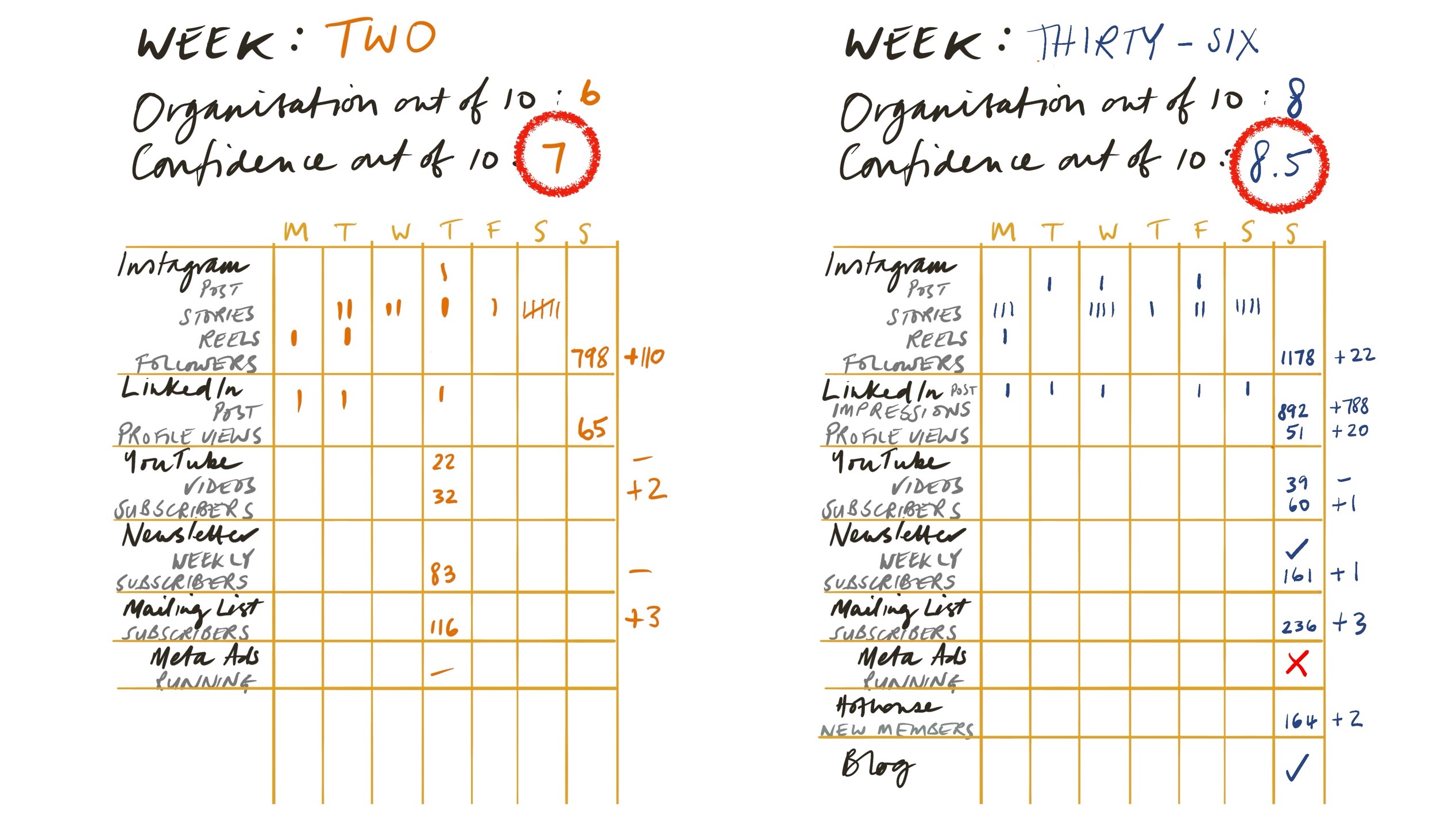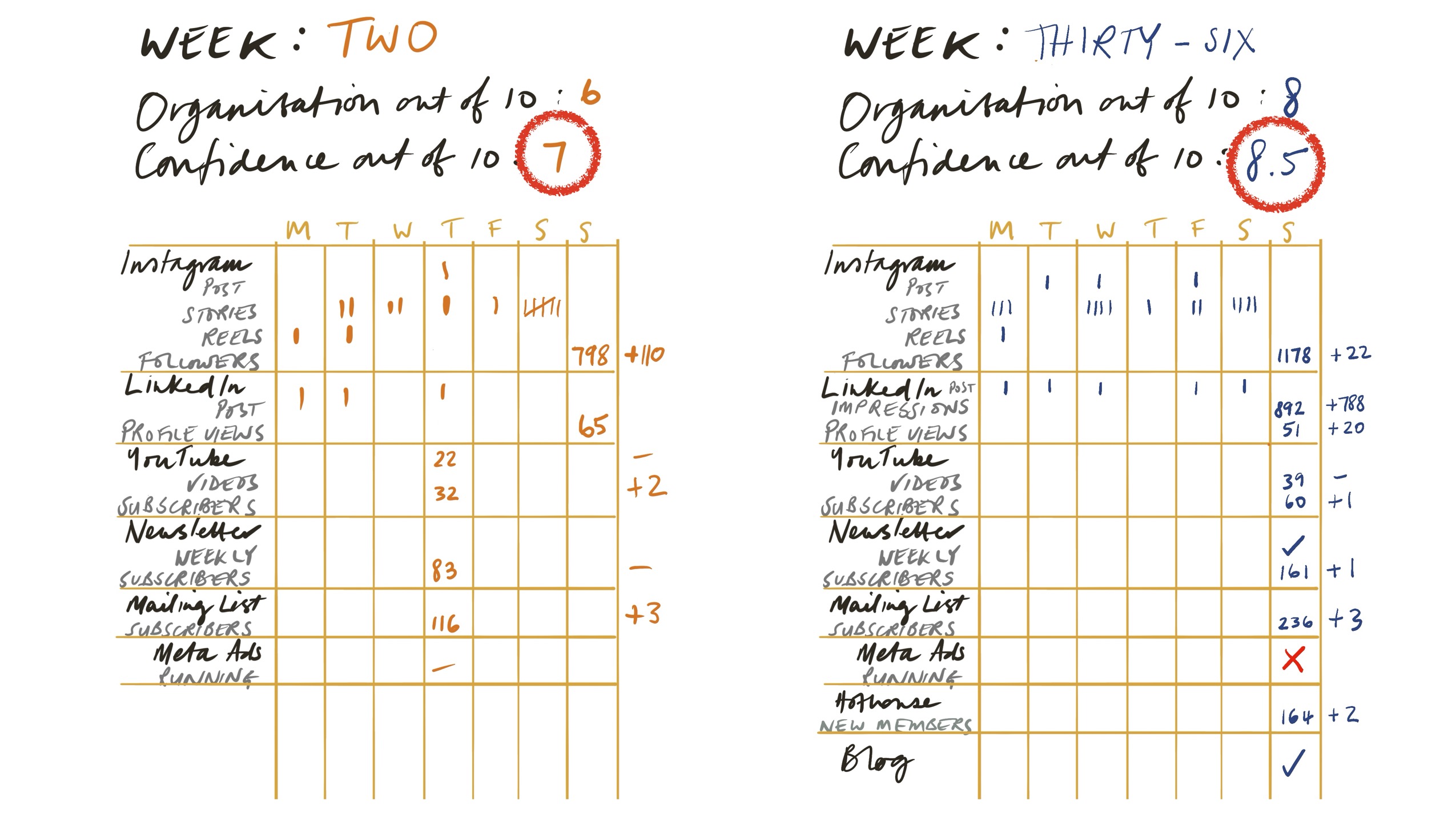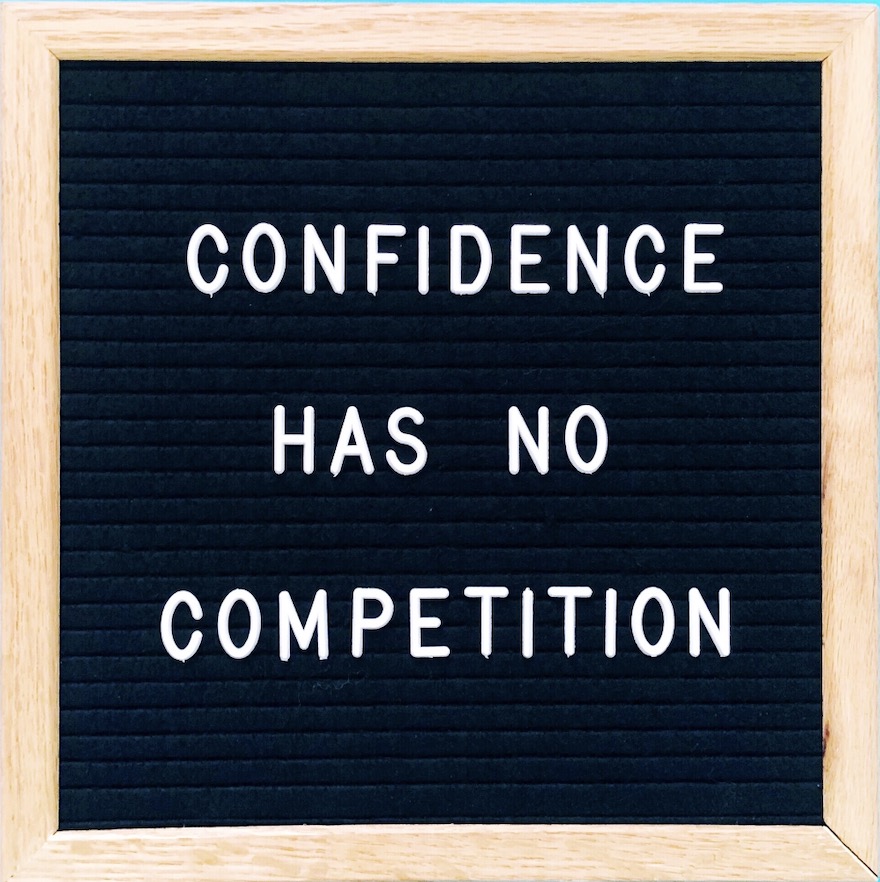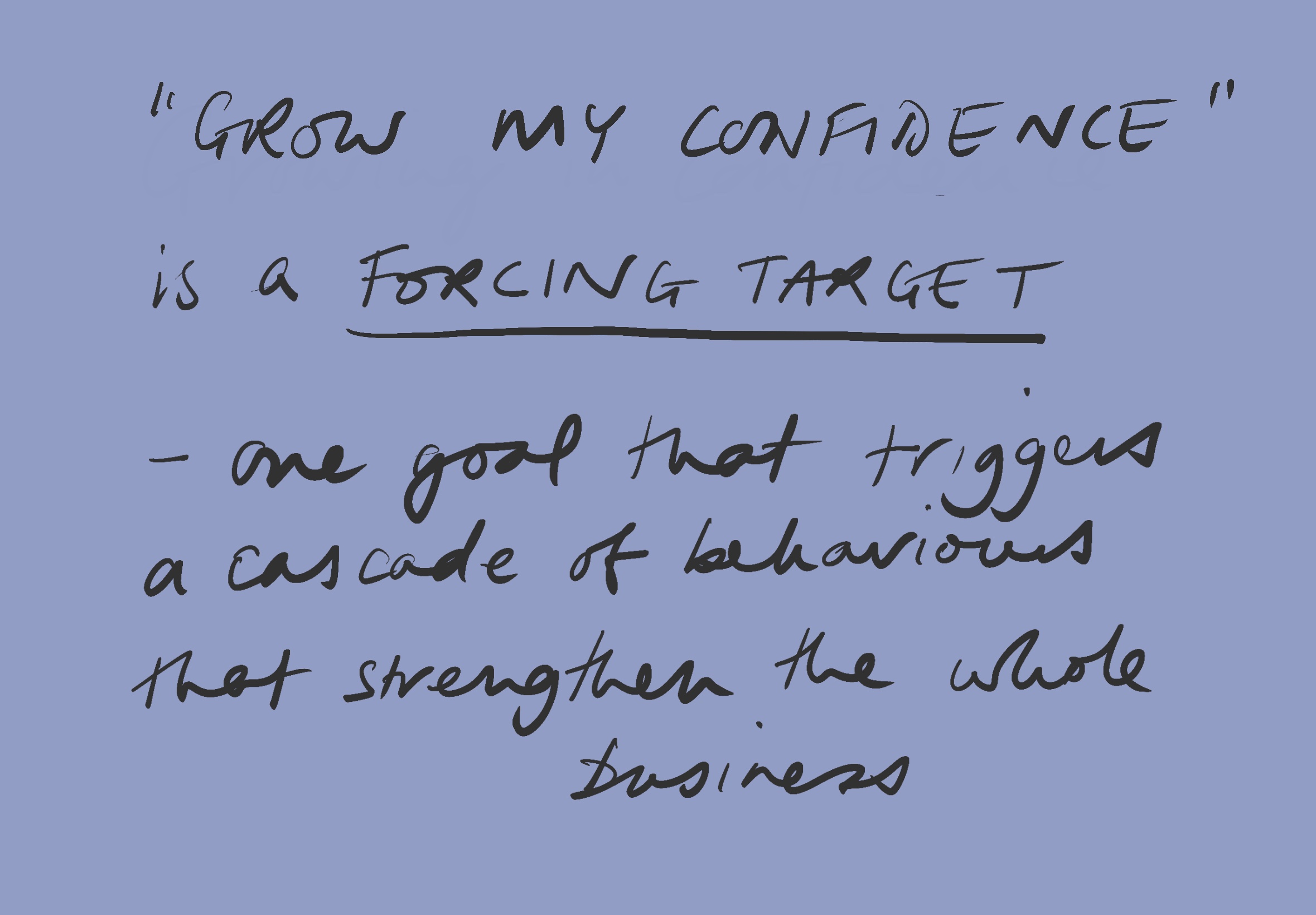
Why Confidence is the Cornerstone of Entrepreneurial Success
Sep 13, 2025Confidence is irresistible. In my time as Director of KLC, I witnessed literally hundreds of student presentations. Of course, the quality of visual presentation mattered - but if you told me I could choose only one of two things for a designer, confidence or drawing skills, I’d take confidence every time.
Why? Because confidence carries the room. It wins trust, sells ideas, and holds attention in a way technical skill alone can’t.
If confidence were some God-given, binary gift - either you’ve got it or you haven’t - it would feel cruel to celebrate it so loudly. But the good news is, it’s not fixed. Confidence can be cultivated. It can be measured. And it can grow.

I know this because I’ve tracked my own confidence every single week this year (see above Week 2 - the first confidence reading I took - compared to last week, Week 36).
Thanks to intentional steps I’ve taken, I’ve seen mine increase by more than 20% since January. That’s not luck - that’s evidence that confidence responds to focus, just like any other business metric. I spoke about this on Instagram last week because, for the first time ever, I see that a '9' is not an impossibility for me.
Why Confidence Should Be One of Your Business Metrics
When you think of business metrics, you probably picture revenue, marketing reach, maybe even social media followers. But how many of us track something far more personal - our confidence?
I’d argue it’s just as vital. In fact, I believe confidence is a metric you should measure and monitor alongside the numbers on your spreadsheets. Because here’s the truth: no matter how well-designed your systems, proposals, or plans are, your business can only ever be carried forward by you, the founder. And if your confidence dips too low, everything else risks crumbling with it.
What We Mean by Confidence
Confidence in business isn’t about arrogance or pretending to know it all. Academic literature calls it self-efficacy - the belief in your own ability to tackle challenges, adapt, and persist when things get tough.
Confidence means you can:
- Send a proposal without second-guessing yourself.
- Hold your fee even when a client pushes back.
- Keep moving forward when suppliers delay, contractors slip, or mistakes happen.
- Attract clients, persuading them that no one else compares, and that your designs are golden.
It’s less about being fearless, more about being resilient.
What the Research Shows
Confidence isn’t just a nice-to-have. It’s been studied, measured, and linked directly to business outcomes:
- Entrepreneurial self-efficacy (belief in your ability to handle entrepreneurial tasks) is strongly correlated with higher business performance and resilience over time (E-signals, 2021).
- Higher self-confidence predicts whether people become entrepreneurs at all - and how well they succeed once they do (ScienceDirect, 2023).
- Studies of founder personality show traits tied to confidence (resilience, optimism, emotional stability) predict success more reliably than industry or funding environment (Columbia Business School, 2023).
- In emerging markets, entrepreneurs with high self-efficacy take bolder but smarter decisions, cope with uncertainty better, and achieve higher performance (Journal of Small Business Strategy, 2024).
Put simply: confident founders are more likely to start, sustain, and grow successful businesses.
The 1–10 Confidence Scale
So, how do I track my confidence - something so personal? Simply by reflecting on how I feel, and rating myself honestly on a simple 1–10 scale:
- 1 = rock-bottom: paralysed, doubting every decision
- 5 = neutral: sometimes steady, often second-guessing
- 7 = the baseline: solid belief you can handle setbacks and keep moving
- 10 = bullet-proof: unshakable self-belief, almost nothing throws you
Here’s my assertion: to carry your business through thick and thin, you need to operate at no lower than a 7. Below that, you risk undercharging, over-giving, or folding under pressure.
Why a Minimum of 7 Matters
At 7, you don’t need to feel invincible - but you have a buffer. A baseline that allows you to:
- Push proposals out the door without endless tinkering
- Say “no” when a client’s requests creep beyond scope
- Bounce back when projects stall or criticism stings
- Stay motivated in the messy middle of long projects
- Look to the future and plan with some degree of excitement
Anything lower, and cracks might start to appear under pressure.
How to Track Confidence as a Metric
- Rate yourself weekly. It only takes 10 seconds to jot down your score - 1 to 10.
- Note what’s influencing it. Did a client meeting raise you to a 9? Did a difficult email knock you to a 5?
- Spot patterns. Over time, you’ll see which activities reliably build or erode confidence.
- Correlate with business performance. Compare your confidence scores with actual metrics - revenue, proposals sent, clients signed. The links will surprise you.
- Build habits to lift your baseline. Mentorship, systems that reduce uncertainty, mindset work, peer group support, even fitness and wellbeing all contribute to holding that ‘7’ floor.
How to Nurture and Grow Your Confidence as a Business Founder
If confidence is one of the most important metrics in your business - and I believe it is - then the next question is obvious: how do you grow it?
Unlike revenue or followers, confidence doesn’t increase by sheer volume of activity. It grows when you deliberately nurture it, protect it, and build a foundation that makes self-belief sustainable.
The good news? If your confidence score is a ‘6’ today, you can move it to a ‘7’ or ‘8’ with conscious effort.
Four Routes to Confidence Growth
1. Competence → Confidence
Confidence grows when you know what you’re doing. That doesn’t mean you need to know everything. But every time you master a skill - whether pricing a project properly, handling a client meeting, or learning a new tool - you prove to yourself that you can.
👉 Practical step: Choose one skill you feel shaky on and invest time in it this quarter. Competence in that area will immediately raise your confidence floor.
2. Evidence → Confidence
Confidence thrives on receipts. You need reminders of your own capability. Without them, your brain defaults to doubt.
👉 Practical step: Keep a “Confidence File” - testimonials, kind client emails, project photos, successful proposals. When your score dips, open it. Evidence is the antidote to imposter syndrome.
3. Environment → Confidence
The people and systems around you matter. Chaos and negativity erode confidence; clarity and support strengthen it.
👉 Practical step: Audit your environment. Do your systems reduce overwhelm or create it? Do your peers lift you up or drain you? Small changes here make a disproportionate difference to how steady you feel.

4. Stretch → Confidence
Just like muscle, confidence grows strongest when it’s stretched. This year, my own confidence has risen most because I’ve had to step outside my comfort zone - taking decisions in my business that forced me to do things I wasn’t entirely sure I could do.
When I didn’t fail at those things, my belief in my own capability grew. It’s the same principle as strength training: muscles need micro-tears from exertion in order to rebuild stronger. Confidence works exactly the same way.
👉 Practical step: Set yourself one small challenge each month that feels slightly uncomfortable - pitching to someone new, raising your fee, speaking at an event. The act of stretching, and discovering you can survive it, builds the deep reserves of self-belief that carry you forward.

Intention is the starting point, and the aim of 'growing in confidence' is one of my favourite things: a forcing target - by setting a single ambitious target, you end up activating a whole set of other behaviours that benefit the business.
Here’s why:
-
To raise your confidence baseline, you inevitably have to improve multiple other areas of your business and life.
-
You might need to tighten systems (so you feel more in control), practice skills (competence breeds confidence), get visible (posting, pitching, presenting), and manage boundaries (saying no, holding fees).
-
Each of those behaviours has a direct impact on business performance - but the forcing target is simply “grow my confidence.”
Growing Confidence Over Time
Think of it as a compound effect. Each small, steady choice to back yourself builds a stronger baseline. Over six months, you’ll notice:
- Fewer wobbles when quoting fees
- More resilience in the face of setbacks
- A quicker bounce-back from criticism
- More willingness to take calculated risks
- Higher client conversion levels
By twelve months, that baseline of 7 may feel like your new normal - and you’ll be building from there.
Closing Thought
With the Big Push coming in Q4, you could focus on building confidence - with an intentional approach, you could see a difference in three months.
Confidence isn’t about never doubting yourself. It’s about holding steady when the doubts come.
If you make confidence a deliberate part of your business growth - measured, nurtured, and strengthened - you’ll find that everything else flows more easily. Clients trust you more, pricing feels less fraught, and growth feels possible, even exciting.
Confidence isn’t just personal. It’s professional capital. Grow it intentionally, and it will carry your business forward.
Receive my quick-to-read weekly newsletter...
Sign up for the Hothouse Newsletter: find out what's coming up, and keep up with recent webinars, blogposts, videos, and other events - all focused on excellence in interior design practice.
We hate SPAM. We will never sell your information, for any reason.

